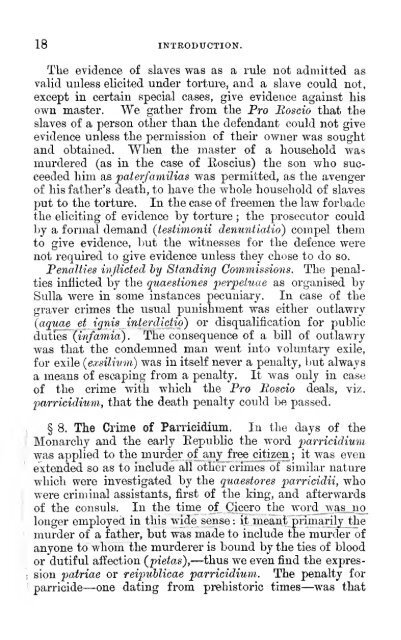Pro S. Roscio Amerino
Pro S. Roscio Amerino
Pro S. Roscio Amerino
You also want an ePaper? Increase the reach of your titles
YUMPU automatically turns print PDFs into web optimized ePapers that Google loves.
18 INTRODTTCTION.<br />
The evidence of slaves was as a rule uot admitted as<br />
valid unless elicited under torture, and a slave could not,<br />
except in certain special cases, give evidence against liis<br />
own master. We gatlier from tlie <strong>Pro</strong> Boscio tliat the<br />
slaves of a person other than the defendant could not give<br />
evidence unless the permission of their owner was sought<br />
and obtained. When the master of a household was<br />
murdered (as in the case of Eoscius) the son who succeeded<br />
him as paterfamilias was permitted, as the avenger<br />
of his father's death, to have the whole household of slaves<br />
put to the torture. In the case of freemen the law forbade<br />
the eliciting of evidence by torture ; the prosecutor could<br />
by a formal demand (testimonii denuntiatio) compel them<br />
to give evideuce, but the witnesses for the defence were<br />
not required to give evidence unless they chose to do so.<br />
PenaUies inflicted hy Standing Commissions. The penalties<br />
inflicted by the quaestiones perjpetuae as organised by<br />
Sulla were in some instances pecuniary. In case of the<br />
graver crimes the usual punishment was either outlawry<br />
{aquae et ignis interdictio) or disqualification for pubhc<br />
duties (infamia) . The consequence of a bill of outlawry<br />
was tliat the condemued man went into voluntary exile,<br />
for exile (exsilium) was in itself never a penalty, but always<br />
a means of escaping from a penalty. It was only in case<br />
of the crime with which the <strong>Pro</strong> Eoscio deals, viz.<br />
parricidium, that the death penalty could be passed.<br />
§ 8. The Crime of Parricidium. In the days of the<br />
Monarchy and the early EepubUc the word pa?Ttci(?wm<br />
was applied to the murder of any free citizen ; it was even<br />
extended so as to include all other crimes of similar nature<br />
which were investigated by the quaestores imrricidii, who<br />
were criminal assistants, first of the king, and afterwards<br />
of the consuls. In the time of Cicero the word was^jao<br />
louger employed in this wide sense : it meant primarily the<br />
mui'der of a father, but was made to include the murder of<br />
anyone to whom the murderer is bound by the ties of blood<br />
or dutiful affection (pietas),—thus we even find the expression<br />
patriae or reipuhlicae parricidium. The penalty for<br />
parricide—one dating from prehistoric times—was that

















